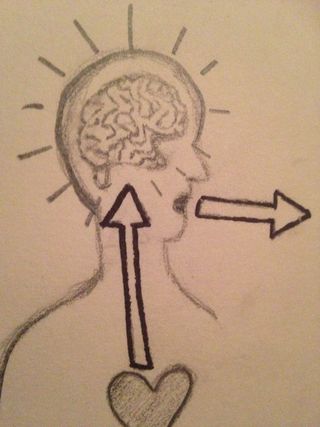Mindfulness
Mindful Arguing
Arguing with a loved one doesn't have to be wrought with emotion.
Posted January 22, 2016

Throughout my career as a therapist I’ve dealt with clients for who conflict with others is an issue, whether it is romantic partners, family members, or coworkers. One of the ways therapists help clients evaluate the conflict is through taking an objective view. An objective, non-judgmental, detached view is the heart of mindfulness. Rather than waiting until one has calmed down to gain this view, mindfulness can be applied when the conflict arises, and one can mindfully argue.
First, many identify arguing with high emotion. This is not necessarily true. Arguing occurs whenever there is a conflict of goals or opinions. Lawyers, who argue for a living, are an excellent example. They often do so in a dispassionate fashion, only using emotion when it benefits the argument.
Jon Kabat-Zinn operationally defines mindfulness as, “the awareness that arises from paying attention on purpose, in the present moment, nonjudgmentally” (Simon). It is a detached awareness; it does not avoid the emotions, it holds them in attentiveness. It recognizes the bias, the judgments, but keeps them from affecting decisions or actions. This awareness is difficult to maintain, as it is the mind’s nature to wonder into the past and future. The mind is quite often led unconsciously through conditioning. There may be no place this is more evident than in an argument.
One way to be less overtaken by the emotions of an argument is the realization that one’s perspective is biased and, quite likely, distorted. There are many psychological and neurological reasons our perceptions are skewed, from the negative bias of our brain, to fundamental attribution error, to self-serving bias (I discussed many of the ways thinking is distorted in “The Truth Will Not Set You Free”). If one can be mindful of her own bias, and that her perception is skewed, as well as the motivation she is experiencing to argue (defensiveness, for example), then this can diffuse any emotion and allow logical argument.
In a November episode of “Hidden Brain” on NPR, the discussion focused on how typical conflict focuses on the positives of oneself, but views the other as negative. This leads to a failure to find common ground. It also leads to both parties being defensive. They suggest that perceiving the other’s motives as positive may help remove the defensive emotions attached to arguing.
This is often a cognitive reframe utilized in therapy. Since many in therapy are discussing conflict with those they love, this intervention can be very effective. Although often it is difficult when emotional in the moment to view the other’s motives as originating in a loving place, this can, when applied, lead to the dampening of emotion and to the argument being based more in logic.
In the first episode of “Hidden Brain”, Sheila Heen discusses how frequently, when receiving feedback, the subject gets changed in response. The couple then often ends up discussing two different topics. Heen calls this “switch-tracking”. She uses an example where the female is upset because the male brought her roses, having ignored previous statements that roses are disliked. The male in the scenario argues that his partner should be grateful for his thoughtfulness. Though there is a common thread, each is defending their belief the other is at fault, but for different things (not really hearing her, for ingratitude).
Heen goes on to discuss how switch-tracking can result in a silent discussion in one’s head when there is a hierarchical differentiation. So, if it is one’s boss providing feedback, much of what is said may not be heard as a result of the internal dialogue about a similar, but different, topic.
One result of mindfulness is presence. Any therapist can tell you being present is essential to actually listening to/ hearing your contemporary. Being heard, especially without judgment, can be incredibly powerful and may further diffuse any emotion permeating the argument. It certainly goes a long way to making the disagreement more clear and rational.
Imagine how an argument might be changed through mindfulness: First, one could be aware that his perception is skewed and biased. Second, he can focus on the positive motives of the other. At worst, if no positive motives can be attributed, the negative motives can be negated, and attributed to the other’s defenses. Next, any emotions arising can be held in awareness, rather than acted upon. Finally, the disagreement can be handled logically, focused on the issue at hand rather than defensive standings or switch-tracking.
Mindfulness may seem like a panacea, not only to arguments, but as I’ve written previously, to so many issues in life. The difficulty is in its application. It is difficult when emotions are neutral to be mindful, and even more so when one is drawn into an argument and reflexive defenses arise. However, there are many benefits to mindfully arguing. Even if one cannot do it successfully every time, the reduction in emotional charge when able to use mindfulness will certainly pay multiple benefits.
Copyright William Berry, 2016
References:
Hidden Brain; September 22, 2015; Trying To Change, Or Changing The Subject? How Feedback Gets Derailed; NPR, Retrieved from: http://www.npr.org/2015/09/22/434597124/trying-to-change-or-changing-th…
Hidden Brain; November 24, 2015; How To Survive (And Maybe Even Enjoy) Thanksgiving Dinner; NPR, Retrieved from: http://www.npr.org/2015/11/24/456824538/how-to-survive-and-maybe-even-e… on January 17th, 2016.
Simon, R; 2015; Mindfulness And Awareness According To Jon Kabat-Zinn:
The Father of MBSR Reflects on Mindfulness Today; Retrieved from: http://www.psychotherapynetworker.org/daily/posts/mindfulness/mindfulne…




